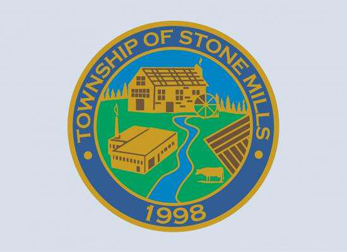Adam Prudhomme
Editor
Stone Mills council has requested Quinte Conservation look into the possible existence of a watercourse that leads from the property of a proposed hog farm in Erinsville to Beaver Lake.
Deputy reeve John Wise put forward the successful motion that Quinte Conservation examine claims made by the Concerned Community Citizens of the Environment (CCCE) as soon as possible during Monday’s council meeting, which was held virtually and broadcast on the township’s YouTube channel.
Prior to the meeting, council heard from members of the CCCE, as well as the hog farm applicant Mark Slack of Slack Family Farms Inc. In late May council voted to approve the site plan application for the property on Waddell Road and had until June 17 to issue a building permit.
The CCCE had asked council to delay issuing the permit by 60 days and to require Slack allow their experts access to the property to study it and look for any potential environmental risks. They say those concerns include contamination of nearby wells and open waters.
“This is not about being against farming,” said Mark Oliver of the CCCE. “We emphatically state that we support our farming heritage and community. Above all else, this is now about public health. As such, it should have invited public consultation before moving to approve the application. There was no notice given and no invitation for meaningful public consultation.”
Those with neighbouring properties have voiced their disapproval that council issued the site approval without any public consultation-especially given the controversy that surrounded the issue almost 20 years earlier. Provincial laws that prevented the project going forward back then have changed since that time.
“For those that don’t know this is the second attempt by the Slack family to locate an intensive hog operation at this location,” added Jeff Whan, also of the CCCE, referring to Slack’s unsuccessful attempt in 2001. “Many of us on the committee were here for the first fight and some of you on council were as well so you remember what happened. It was a difficult time for all of us and I think you know in the community now there’s a major amount of concern about this proposal.”
During the presentation, Susan Moore, also of the CCCE, spoke of a watercourse she says her experts have identified on the property that wasn’t noted in the original site plan application.
“This map shows there clearly is a stream leading from the middle of the Slack property to Beaver Lake,” said Moore. “This was taken in the spring time. Note that parts of the stream and wetlands that dry up in the summer may still be there underground…Not only is there a risk to public health, a constant flow of contaminated ground water or a spill from a manure lagoon could change the Salmon River from a flow of clean ecologically healthy water into the Bay of Quinte, to a damaging toxic inflow just when the Bay of Quinte is regaining its health.”
Jason Sands, manager of planning with Stone Mills noted council would be hard pressed to not issue the permit at this point, having already approved the site plan application.
“If we found ourselves in such a position, due to council refusing to grant site plan control approval to Mr. Slack, Mr. Slack would have three hydrogeologists as technical experts on his side under expert witnesses who would be subpoenaed, he would have myself as a planner, he would have OMAFRA who has already issued the nutrient management approval, and I have not yet heard to date a technical expert who is contesting any of the technical merit to a specific inclusion within this site plan agreement,” said Sands. “I’m struggling to understand who would defend council’s decision at an LPAT (Local Planning Appeals Tribunal) hearing to an application that would be refused.”
That doesn’t mean any new information found after the permit was issued couldn’t halt the project. Sands also noted a final condition of occupancy of the property was that all public health concerns be met to the satisfaction of Quinte Conservation.
“We’re assuming that there actually is a newly discovered stream,” said Wise. “We don’t know if that’s the case. That’s something that somebody has drawn on a map. If there is, then it’s certainly of interest.”
“If any errors or omissions are discovered, regardless whether a building permit has been issued or not, they have to be addressed,” Wise added. “The deadline of the building permit doesn’t mean that if Mark (Boone, drought management project coordinator with Quinte Conservation) isn’t available (Tuesday) or Wednesday or whenever that we can’t ask him to have a look at Susan’s information and if necessary attend the property. If he discovers that a further set back is required, then it will have to be done.”
When asked by council as to his farming background, Slack said he is university educated with 30 years experience in the hog farming industry.
“Fundamentally if you take a step back, the process is established with tremendous guidelines and parameters that anybody, if they adhere to should be able to walk forward,” said Slack, who told council the project is already behind schedule and he didn’t want to wait any longer to move forward. “We believe we have done everything and actually we’ve done more than our fair share of what we needed to do and we fully expect to be moving forward. I think it would send a tremendous negative signal to any body that’s trying to develop anything that it can simply be derailed by ratepayers who are half informed and fully engaged.”
“We’ve got a clean slate and the assumption that we’re not going to have one is insulting at the least,” added Slack.

